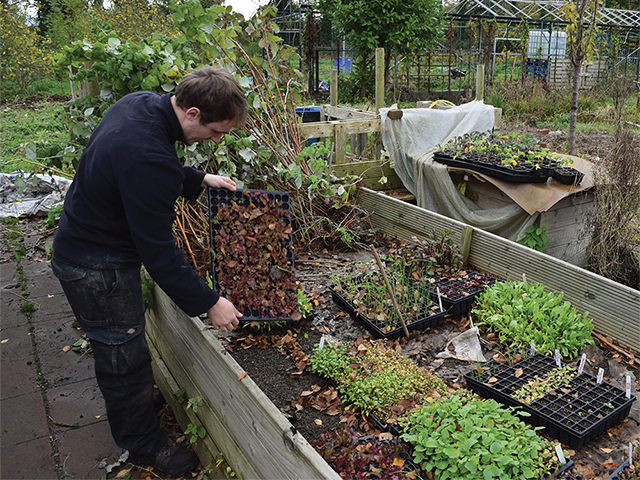
[dropcap]A[/dropcap]s you walk into DCU’s community garden, tucked away in a corner behind the library, the sounds of the outside world fade from earshot as a myriad of sights and smells cocoon you in an isolated world of greenery and vegetation.
As recently as 2013, however, the garden was empty and had been out of use for over ten years.
“When we found it, it was nothing but a barren patch” said Samantha Fahy, Sustainability Officer at DCU.
Fahy started small. After applying for €2,500 in funding from Local Agenda 21 to clear the garden, she started a collaboration with DCU’s green committee and Horticultural Society to re-generate the garden.
Resources came from Corporate Social Responsibility projects, a collaboration of DCU and An Taisce’s green communities program. Companies organised volunteer days, such as Deloitte funding and constructing a polytunnel in the garden. Student projects accommodated for the lack of water, waste and electric services in the garden, such as a water filtration system and a beehive research project. The President’s award for engagement in 2014 was awarded to the Horticultural Society for their efforts.
However, the garden had a problem with long-term engagement, due to incompatibility of the undergraduate timetable and growing seasons, according to Fahy.
The solution? Garden Gnomes.
The Gnomes, a group of agricultural entrepreneurs, volunteered in DCU’s community garden for over a year under the Community Employment scheme, developing techniques for biologically intensive farming. Training for about 20 hours a week, the Gnomes brought a lasting consistency to the garden.
“The guys provided the continuity so that when people weren’t down there the garden still ticked along, the briars didn’t grow back over again,” said Fahy.
Essentially, bio-intensive farming focuses on yielding as many crops out of a small area as possible. “You’re reducing the need for a tractor; what you can do is you can grow about five times the crops on the same amount of area that you would conventionally, so you’re reducing the amount of space between crops,” according to member Martin Matthews.
These techniques have allowed the group to produce over 500kg of crops in just two poly-tunnels, 1/50th of an acre, since May, according to Matthews.
Matthews and member Jason Maguire came up with the idea of The Gnomes out of a shared passion for agricultural work.
“You’re unconsciously connecting with nature, you’re unwinding, you’re relieving a lot of stress and anxiety when you’re working with the plants. You get a deeper understanding of life,” said Matthews.
The Gnomes stressed the benefits of ‘getting your hands dirty’ for the headspace of students, with Martin describing garden work as providing an outlet for his anxiety during college.
“I do come down here, just, there’s a smile on my face for no reason but I know it’s because of this place,” said member Shane Matthews.
Developing a community
For Fahy, the garden represents a chance to change the negative perception of DCU in the wider Santry community. She mentioned a retired man who visited the garden after a line of trees were cut down behind the library, allowing him to see it for the first time. He initially worried that he’d be kicked out if security found him.
Fahy heard about the man and gave him a visitor’s card for DCU.
“He could now wander in and out whenever he wanted, all he’d do was go down, sit in the garden and have a chat with the lads… for him it was an engagement, it was someplace for him to go.”
Travelling to the garden provided him with a source for exercise and a healthier diet. “Everybody wins, and he’s pulled a few weeds along the way,” laughed Fahy.
The development of both a men’s shed and a social shed for the garden are receiving funding from Dublin City Council. DCU plan on collaborating with the Ballymun men’s shed to operate the sheds upon their projected completion in early 2018.
These projects are part of DCU’s action plan to achieve Carbon neutrality by 2022. Fahy and DCU plan on expanding community gardens to the St. Patrick’s and All Hallows DCU campuses, as well as creating native grassland, woodland and school garden areas in the St. Patrick’s campus.
“The reason we’re doing this is so we can educate new students. The whole idea is to open their mind-sets so that the students who are leaving DCU have an understanding of what sustainability means, to understand what their impact is on the world and what they can actually change,” said Fahy.
The Gnomes and Fahy want to introduce a guided volunteer program to encourage students to participate in the garden, suggesting that students look after small four-by-two foot allotments.
With winter setting in, the Gnomes set about covering the ground, removing shale, weeding and clearing the polytunnels. Despite the cold, these old friends find comfort and companionship over some hard labour, a connection to the soil and a cup of tea.





